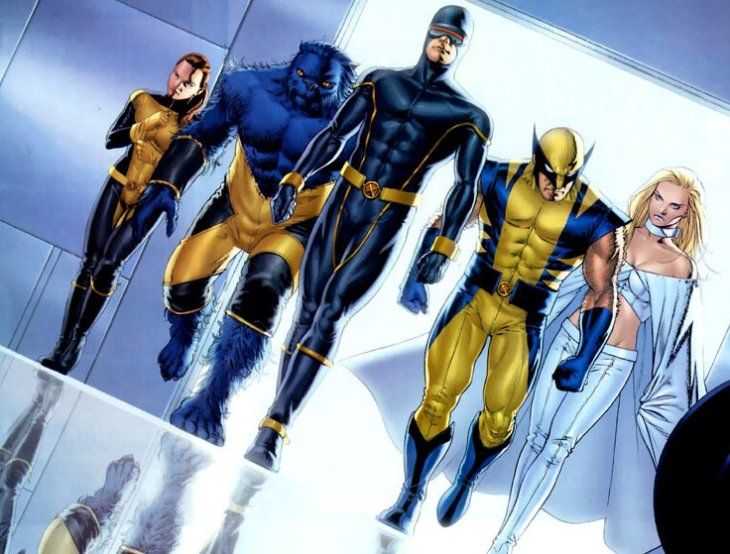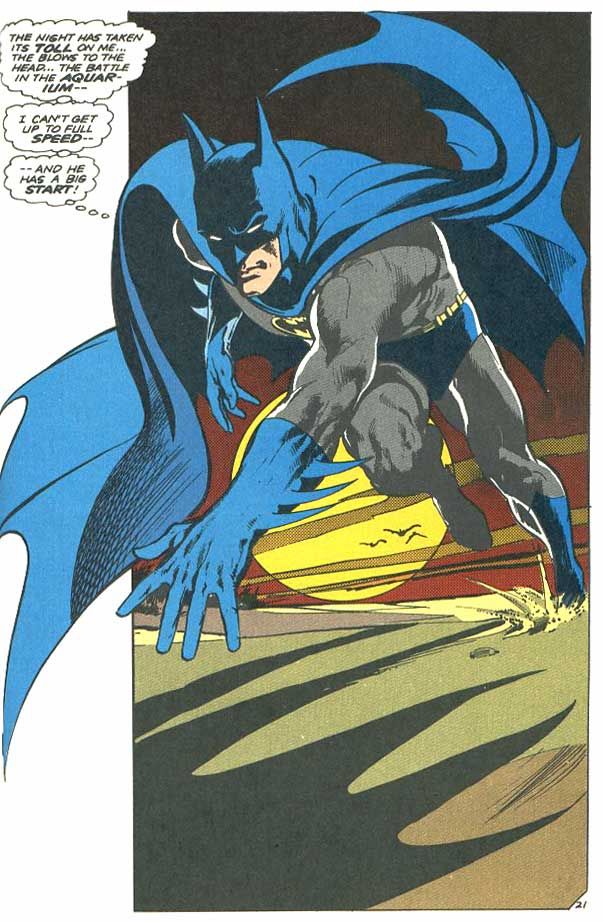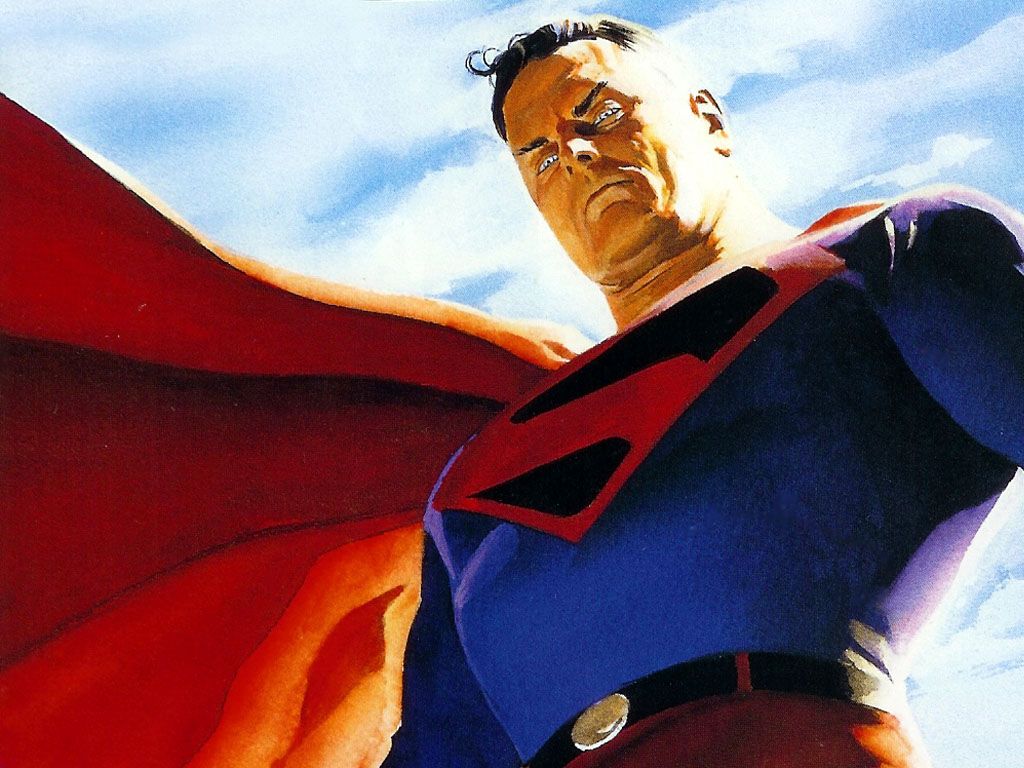At times it seems as if writing a comic about an established character is some sort of twisted game. Writers are asked to not only write compelling storylines, but also honor the existing character of the heroes depicted, have them speak with their own voice and language, and behave as people expect them to. While I love the freedom my favorite writers get when they create their own characters, I'm much more curious to read how they deal with well established characters.
You know that game where you fold a piece of paper into three parts, one person draws the head, another the torso, and another person draws the legs, all without unfolding the paper and seeing the whole until the drawing is finished? I always thought it was sort of creepy, seeing what would come from working with someone else that way. When I got a bit older, we'd do the version with writing, where one person writes a paragraph, then hands it off, with only the last couple of words to guide the next writer. Weirdly unexpected stories result. It's kind of surreal, less a game than something to mess with your head. I imagine that writing for a long-established character must be something like that for writers, similarly confusing with all the same potential for chaos or magic.
Naturally there are great writers in comic books, people who're superlative storytellers and masters of the sequential art, that sort of thing. It's all well and good to be a good comic book writer, make up stories, work without boundaries. The freaky stuff starts to happen (or doesn't) when these great writers work on long-established characters, the superheroes who have been around for decades. Created by other people, worked on by hundreds of teams of people over the years, continuously changing.
My favorite schizophrenic example of this kind of character writing at it's weirdest would have to be Batman. I'm not saying he's messed up, but that old tv show really used to confuse me as a kid, especially in tandem with the comics. Is he wacky, or scary? Is he mysterious, or intimidating? It depends who is working on it, and what era you're reading it in. Thankfully Frank Miller brought his intensity to bear on the character, and showed us all that no matter what kind of crazy experiments he indulged in his youth, the Dark Knight Returns showed us that at the end of the day, Batman was the meanest, bleakest one out there. For a lot of us, he finally defined the character, and I think it will to be a hell of long time before anyone depicts Batman go go dancing.
If we acknowledge t that our old favorites don't always conform to their "true" character, what kind of writing is it that works best? When great comic book writers are asked to write a character that they didn't come up with, the key seems to be staying faithful to the characters, letting them speak with their own voices. The best writers are able to propel story and maintain the character's voice, without imposing his or her own voice. Some writers can slip right into the skin of a character invented by someone else, and write dialogue and actions that fit perfectly and are unique to that character.
When Joss Whedon started Astonishing X-Men, I was all ready to ignore it. Not because I don't love Whedon, but because I was so burned on the X-Men. After the weird dilution of them during the weird early 90's, I was wary of reading them again, but Whedon slid right into X-Men mode, with a stripped-down team, he nailed the interaction between the team, reminded me of why I loved them and hooked me all over again. For my money, it was the first time I had recognized them since bloody Claremont was writing them, not because no one had done a good job since them, but because no one had so perfectly nailed the dorky dialogue and mundane day-to-day interaction so perfectly for me. Whedon was smart, he picked characters who echo his own interests, his own regular cast of characters - the stoic leader, the sexy/blunt/inhuman character, the violent/sexy loner, the sweet little girl warrior, and the wise and educated avuncular type. Works for me, because that's how I see them too.
Frank Miller's work on Daredevil is probably my favorite example of a writer with a strong personal viewpoint, who is simultaneously able to effectively wear the skin of the character. Miller shaped my view of who Daredevil is, to the extent that I still judge all subsequent incarnations of the character by these standards. He's a raw, wounded, powerful man discovering his past in order to become a whole person. I suppose I liked all of the back story and history because I was young, but it's not just that. Miller's take gave him so much potency and life, he struggles with himself as much as with crime, and while at times the storylines are a little naive (e.g. drugs that don't do what they're meant to, or people behaving illogically), the raw humanity of Daredevil shines through. It's very typically Miller in some ways, (that tortured, isolated loner hero), and in other ways it is very much classic Daredevil and really adds to the myth.
While I cut my teeth on John Byrne's steadfast Superman, he quickly started to feel a bit basic (which I think was the idea.) It worked well for me at first, but as I got older I began looking for complexity and gray areas, which I thought Superman's sunny disposition precluded. Then Mark Waid wrote Kingdom Come, and presented an adult, middle-aged Superman, a man with depth. For the first time in years, the character made sense to me. With a a past behind him, this was a Superman I could believe in. In the intervening years I'd read a number of wonderful Superman books, which had exuded the same innate goodness and responsibility that I'd come to expect from the Superman I'd grown up with. Waid's Superman was the first to stay faithful to that big-hearted hero, and still allow for emotional depth. He wrestled with himself, judged himself, and relied on his colleagues and friends to help him move on. It was an incredible leap forward for my understanding of the character. As a mature man, he saw the gray areas in the world and doubted himself. That crack in the veneer, that imperfection gave me the glimpse of warmth and accessibility that the character had lost over the years, and without damaging the integrity of Superman, or imposing Waid's own voice, he highlighted an entirely new dimension of Superman that got me hooked all over again.
There are a lot more examples of this weird skill, this is just a very small selection of writers who, like chameleons, write another persons creation and maintain the integrity of the characters long history. It's an eerie sort of a skill, and not one that I can imagine would be useful to them outside of comic books, so we can count ourselves fortunate that they've chosen this field with such unique challenges. They breathe life and dimension into these iconic characters who are now an intrinsic part of our culture.



